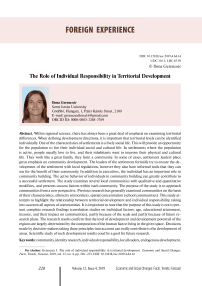The role of individual responsibility in territorial development
Автор: Gerencsr Ilona
Журнал: Economic and Social Changes: Facts, Trends, Forecast @volnc-esc-en
Рубрика: Foreign experience
Статья в выпуске: 4 (64) т.12, 2019 года.
Бесплатный доступ
Within regional science, there has always been a great deal of emphasis on examining territorial differences. When defining development directions, it is important that territorial levels can be identified individually. One of the characteristics of settlements is a lively social life. This will provide an opportunity for the population to live their individual social and cultural life. In settlements where the population is active, people usually love to live, and their inhabitants want to improve their physical and cultural life. They work like a great family, they form a community. In some of cases, settlement leaders place great emphasis on community development. The leaders of the settlement formally try to ensure the development of the settlement with local regulations, however they also have informal tools that they can use for the benefit of their community. In addition to executives, the individual has an important role in community building. The active behavior of individuals in community building can greatly contribute to a successful settlement. The study examines several local communities with qualitative and quantitative modifiers, and presents success factors within each community. The purpose of the study is to approach communities from a new perspective. Previous research has generally examined communities on the basis of their characteristics, ethnicity (minorities), spatial concentration (school communities). This study attempts to highlight the relationship between territorial development and individual responsibility, taking into account all aspects of communities. It is important to note that the purpose of this study is not to present complete research findings (correlation studies on individual factors: age, educational attainment, income, and their impact on communities), partly because of the scale and partly because of future research plans. The research results confirm that the level of development and development potential of the regions are largely determined by the composition of the human factor living in the given space. Decisions made by decision-makers taking these principles into account can really contribute to the development of areas. Scientific study of such development results coud be a goal for future research.
Community, identity research, individual responsibility, local leaders, endogenous development
Короткий адрес: https://sciup.org/147224197
IDR: 147224197 | УДК: 316.3 | DOI: 10.15838/esc.2019.4.64.14
Текст научной статьи The role of individual responsibility in territorial development
One of the most important tasks of regional development is to reduce the differences between regions with different levels of development. In order to create favorable living conditions, not only financial support is needed, but also the existence of many other factors. Geographical location and natural conditions, which at the same time greatly affect the potential of the regions, may be least affected in regional development. Another decisive factor is the economic environment in which the settlements operate. Man is the formative of natural resources and the economic environment. In this process, the responsibility of community actors and the conditions provided by the policy are indisputable. The study presents the role of communities in shaping the settlement image through the example of six Hungarian settlements and describes ways to experience community life and personal engagement.
Review of conceptual approaches and the research methodology
“Among the views on the content of territorial development, there is a group that considers territorial development from the socio-economic point of view and regards settlement development as essentially technical in nature. The weakness of this approach is that it does not respond to intermediate levels and only highlights some factors, neglects the others, leading to fundamental disturbances in analysis, understanding and influence. Another view is that the territorial development is subordinated to the settlement development. Territorial development must be interpreted at different levels, but always complex (taking into account all its elements)” [1, p. 1]. The current Hungarian territorial policy and the spatial development policy interpret territorial development basically according to the first concept. These policies analyze the spatial characteristics of society and the economy and concentrate on correcting the spatial structure of the spatial structure that is different from what is desired [2, 3]. Similar reasons lead to the development of the European Union (EU) Community policy. The EU has therefore set up various financial development funds (ERDF, ESF, etc.) to reduce regional disparities in development). Today, these have become the most important financial resources for spatial development in the regions, and they seek to reduce differences in development between regions.
Different levels of development or backwardness require different areas of intervention, development, and directions. When defining development directions, it is important that individual territorial levels can be uniquely identified. For example, a region can be uniquely characterized by elements of territorial capital that include geographic location, size, natural resources, heritage, infrastructure, and social capital. “Territorial capital is an aggregate asset that is site or area-specific; and development policy should focus on local values and their continuous renewal” [1, p. 25; 4]. The role of social capital within territorial capital is of paramount importance, as these qualitative characteristics greatly determine the development potential of an area.
When the regional development issues have emerged in regional policy, new methodological ideas have also emerged. In addition to the purely quantitative characteristics, the idea of qualitative indicators and the measurement of them was also raised. The measuring approach based on purely economic grounds is complemented by concepts such as human development, standard of living, and happiness. These are the characteristics of social capital. With the appreciation of these new concepts, measuring territorial development can give a much more nuanced picture of the social and economic characteristics of a region. On the other hand, this opportunity can be used by developing complex indicators and methodological approaches as well [6, 7].
This more subtle approach is reflected in the idea of Enyedi’s territorial inequalities that the geographic differences in human knowledge lay behind the new territorial inequalities [6, 7]. Molnar has same opinion and thinks it is worth breaking with the paradigm that says that a settlement is successful only if it has a well-functioning economy. In his opinion, success is not due solely to economic factors [8]. Goda and Kassai also see human capital development as a key to mitigating territorial disparities and improving the effectiveness of economic development policies [9], as the key to improving regional disparities and improving economic competitiveness. The importance of the role of human factors is also emphasized by the new development trend that emerged in the early nineties, which became known as endogenous development in territorial policy.
“Human capital also plays a key role in endogenous development theories. These developments are based on local resources, such as the potential of the local economy, labour, and knowledge, which are then linked to larger production processes” [10; 11; 12; 13, p. 21]. However, it is also important to note with respect to this theory that only endogenous development alone does not solve the problem of reducing territorial inequalities. Failure to fully respect external circumstances and influencing factors also limits the development potential of a given area [14; 15; 16]. For this reason, the endogenous development cannot be ignored in the development, because the isolation would prevent the influence of external conditions [17].
The exploitation of endogenous resources is also crucial for development, as the functions and role of rural and urban space have changed significantly as a result of globalization. The proper functioning of these new spatial functions requires finding the factors that can contribute not only to the economic but also to the social development of an area. In this sense, Edel sees the community as an endogenous resource. In his opinion, these are solid, yet flexible and essential resources that can be the main drivers of transformation [18; 19; 20]. This assumption is also reflected in the use of financial resources for development. Those regions (regional centers, big cities) use a significant portion of development resources, where social activity is high at the local level and basic resources are found [9].
Social activity can be characterized by relationship and social capital, which, according to social psychology, is the individual’s own. Based on Capello and Faggian’s definition of relationships, we can consider cooperation between economic actors as well as knowledge transfer and exchange of experience, not just at company level, but also between countries, regions, and settlements. Contact capital is a kind of ability to achieve common goals [21; 22; 23]. Bourdieu [24; 25] founded the notion of social capital as a resource based on belonging to a group. In his theory, he made it clear that the size of a person’s social capital depends on the extent of the network of relationships he can actually mobilize. Social capital typically consists of ties, norms, trust, and institutions.
Tonnies described this network of relationships with the concept of community. In his opinion, the concept implies a positive mutual relationship [26]. Therefore, its value is most often positive. It can also express:
– a group of people (youth, amateur community);
– quality (community, community, or atomized society);
– locality (or community);
– joint creation (community theater, community facility, communal investment);
– feeling, intent, belonging to somewhere;
– sharing the same ideas, goals and values [27].
For example, identity can be a common set of values within settlements, which “glues” the community [28; 29; 30; 31]. From the point of view of spatial development, the community is the relationship between the individuals that can promote the development of the given territorial level (settlement, region) and can only be interpreted through the formation of networks between individuals (social networks). In this network of relationships, the key actors in the life of the settlements are individuals (individuals, institutions/organizations, e.g. associations, local government leaders) who play a decisive role in both acquiring external resources and mobilizing internal resources. The connection network thus basically covers features that cannot be quantified. Their knowledge therefore requires qualitative research.
The study presents the experience of empirical research in communities with a successful network. It finds out how the members of communities have recognized the relationship between territorial development from social capital and individual responsibility in generating development. Under individual responsibility in this study we mean how an individual responds to and participates in the resolution of social problems in the environment, and contributes to maintaining the values.
The study contains the partial results of a complex study covering a number of topics, including the network of communities in the settlements. The selection of those settlements where successful community-building activities and contact networks can be observed within the communities was an important consideration in determining the sample area. Six Hungarian cities were included in the sample (Esztergom, Kecskemet, Erd, Csomor, Miskolc, Eger). The communities were analyzed using qualitative and qualitative characteristics. The quantitative indicators were analyzed primarily with the help of the available HCSO database.
The survey method used and accepted for field research and other data collection is the questionnaire, which is suitable for descriptive, explanatory and reconnaissance purposes [32]. The questionnaire covered the key players in the community, the strengths and weaknesses of the community. The questionnaire touched upon the network of contacts within and outside the settlement; and it shows the involvement of individuals within the community and those responsible for community building. In the six settlements (Esztergom, Kecskemet, Erd, Csomor (spring 2016), Miskolc and Eger (spring 2017)) the survey was done with the involvement of Szent Istvan University, Agricultural and Rural Development Engineer, second year students. The method of sampling was arbitrary but it aspires for to be representative. The number of people to be evaluated is 796, of which 60% are women and 40% are men. There was a varied pattern of age, education, occupation and income. The overall evaluation of the responses was done using descriptive and variable statistical methods.
The content and the main findings of the research
The remainder of the study presents qualitative and quantitative research findings. In particular, it first presents the characteristics of the communities in the studied municipalities, drawing on the available statistical databases. An important consideration in the selection of the statistical data was that it should be available and adequate in all settlements, each year of the survey period. It then focuses on the respondents’ general experiences within the community.
Physical characteristics of social networks
Not only is the human side essential to the development of the community network. At least as important are the physical factors and locations that provide the opportunity to experience and develop a sense of belonging to the community. The general community characterization of the settlements therefore focuses on indicators such as cultural events that provide a community experience; the number of regular cultural professions or creative communities.
Cultural events organized either by the municipal government or by NGOs are one of the areas for experiencing a community. They provide an opportunity to meet people who are not in the same circle as a close relative or a group of friends but who are moving to similar interests. Figure 1 shows that the number of events provided to the population in larger settlements over the past decade has risen almost year by year. The number of events decreased in the settlements of the Budapest agglomeration. The reason for this
Figure 1. Number of cultural events (per thousand inhabitants)
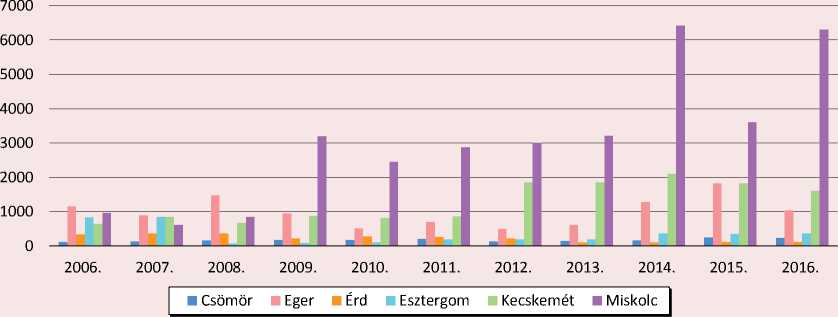
Source: HCSO database based on own editing, 2018.
Figure 2. Number of participants in cultural events (per thousand inhabitants)

■ Csömör ■ Eger ■ Érd ■ Esztergom Kecskemét ■ Miskolc
Source: HCSO database based on own editing, 2018.
is probably that the programs offered by the capital may have a suction effect. In Esztergom, however, some growth has been observed over the years. The number of participants at the events is illustrated in Figure 2 . The number of participants draws a similar pattern to that of the number of events. In large rural towns, the population is visiting a rather large number of events, while the number of visitors in the capital’s nearby settlements is quite underrepresented.
Another form of living in community consciousness can be joint creative activity. Figure 3 shows the number of organizations created for this purpose.
In almost all settlements it can be said that the number of creative communities in the examined period increased continuously. Creative communities are permanent, regularly engaged and mostly managerial communities that present the results of an individual or collaborative creative process to the public.
Figure 3. Number of creative cultural communities (per thousand inhabitants)

2007. 2008. 2009. 2010. 2011. 2012. 2013. 2014. 2015. 2016.
Csömör Eger Érd Esztergom Kecskemét Miskolc
Source: HCSO database based on own editing, 2018.
-
Figure 4. Number of members of creative cultural communities (per thousand inhabitants)
2007. 2008. 2009. 2010. 2011. 2012. 2013. 2014. 2015. 2016.
500 0

Csömör Eger Érd Esztergom Kecskemét Miskolc
Source: HCSO database based on own editing, 2018.
They are grouped as follows: art groups, folk performing arts groups, creative art groups. This is probably related to the steady increase in the number of well-functioning smaller groups and communities. The increase in the number of cultural communities may be related to the increase in the number of applications. Most financial resources were made available to associations on more favorable terms. In this way, the implementation of developments and the operation of the association itself became more efficient. In large cities, the increase in the number of cultural communities can be facilitated by a more concentrated population density, the presence of a well-educated population, and better infrastructure. This assumption is also supported by Figure 4, which shows the changes in the number of members of the creative communities.
A similar trend can be observed in the number of regular cultural activities as illustrated in Figure 5 .
Figure 6 shows the number of participants in cultural activities. It can be seen that the
-
Figure 5. Number of regular cultural sessions (per thousand inhabitants)
2006. 2007. 2008. 2009. 2010. 2011. 2012. 2013. 2014. 2015. 2016.
11 11 li 11 il 111111II111
Csömör Eger Érd Esztergom Kecskemét Miskolc
Source: HCSO database based on own editing, 2018.
Figure 6. Number of participants in the regular cultural occupations (per thousand inhabitants)
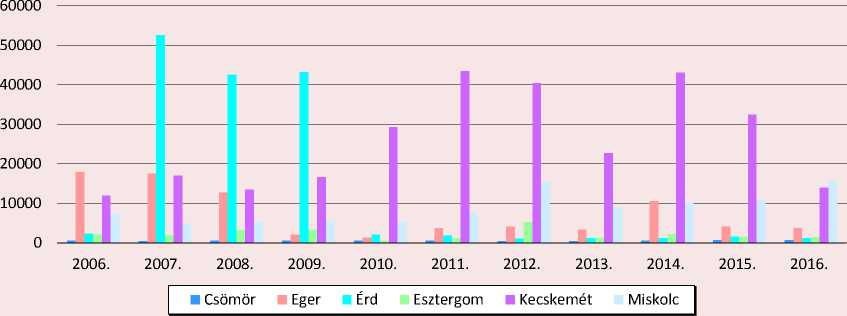
Source: HCSO database based on own editing, 2018.
Figure 7. Distribution of respondents by gender
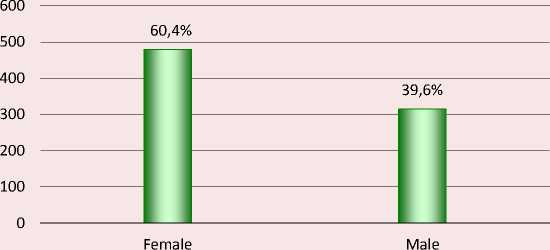
Source: Own research (2016–2017).
Figure 8. Distribution of respondents by permanent address
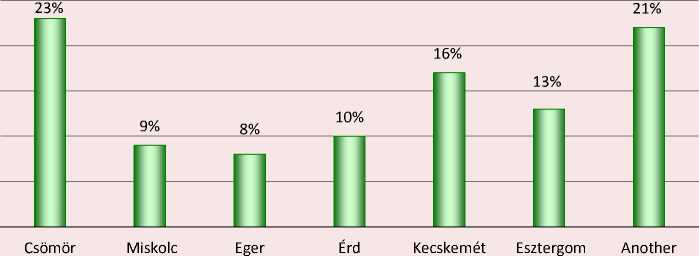
Source: Own research (2016–2017).
attendance of these events was not nearly as popular in smaller rural towns or agglomeration settlements. Indeed, in Miskolc, compared to the number of inhabitants, there was a rather low participation rate among those interested. At the settlement level, these moves were not really successful in terms of community building.
Results of the questionnaire survey
The general characteristics of those involved in the field research are shown in Figures 7–10.
More than half (60.4%) of the respondents were women, and the percentage of men was 39.6%.
Twenty two percent of the respondents live in Csomor, 9% in Miskolc, 8% in Eger, 10% in
Erd, 17% in Kecskemet, 13% in Esztergom and 21% in other settlements.
The average age of the sample was between 38 and 47 years. It was a goal to have a diverse age group in the sample that was achieved. The youngest respondent was 12, while the oldest was 86 years old.
The range of respondents was also broad in terms of characteristics such as income, occupation and education. ( Fig. 9, 10 ).
From the research point of view, it was important to first examine what the respondents think of the term “community” what this word means to them. The vast majority of the respondents identified it with togetherness, programs, friends, reliability, and the settlement itself.
Figure 9. Occupational breakdown of the sample
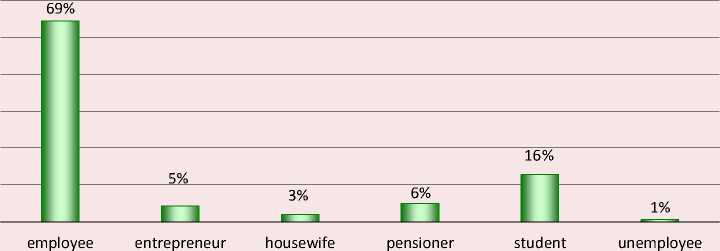
Source: Own research (2016–2017).
Figure 10. Distribution of sample by educational level
Source: Own research (2016–2017).
College / University
Advanced vocational training
High school
High school without graduation / vocational secondary school
Primary schools
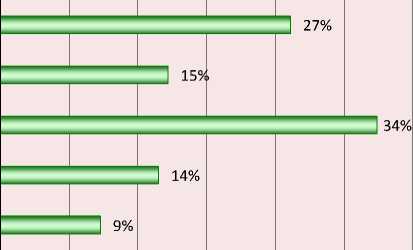
Figure 11. Can you tell about your settlement that you have community consciousness? (persons)
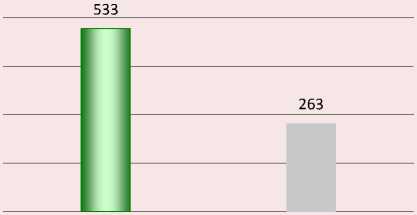
Гп 1. Yes 2. No
Source: Own research (2016–2017).
Figure 12. In what form do you participate in the community life in your settlement?
|
49 % |
||||
|
35 % |
||||
|
13 % |
||||
|
________________________________________________________________________________11_________________________ |
||||
|
2 % 1 % |
||||
|
Actively (as organizer) as Actively (as an Actively (as an Passively (non- I do not live in a municipal worker organizer) through the organizer), volunteer but organizer) community life and the local NGO not a member of a civil opportunities offered by organization the community |
||||
Source: Own research (2016–2017).
When asked if your community has community consciousness, more than 67% of the respondents answered with a definite yes, a negative answer was given by a little over a third of the respondents. ( Fig. 11 ). It can be stated that, overall, the respondents feel that they have a community in some form.
A large proportion of the respondents, 53%, are passive, they only visit events as onlookers; nearly 24% of them are not involved at all, even at the level of passive interest in action.
Three percent of the respondents are part of the community organization as municipal workers, but the proportion of volunteers who are not members of any civil organization, and the proportion of active organizers is rather low (17%) (Fig. 12). The main drivers of the community life of the settlements were those who, on the basis of local patriotism and loyalty toward their community, wanted to shape, and influence their immediate environment and the people living there.
Figure 13. How do you think the municipality is responsible for building a community?
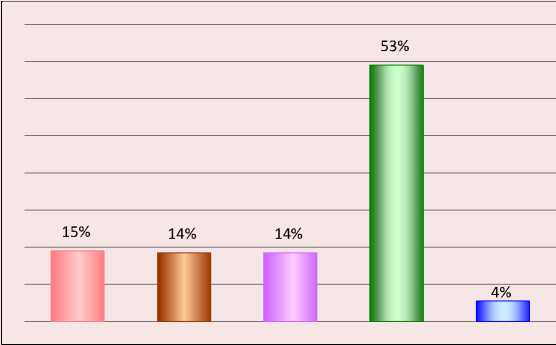
Only for the local government
Partly, especially in cooperation with civilians
Partly, in collaboration with the population
Partly, in collaboration with civilians and the population
It is not the responsibility of the municipality
Source: Own research (2016–2017).
Figure 14. Do you know the local government developments in the settlement?
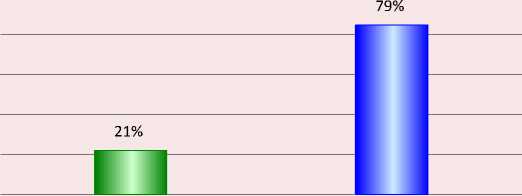
Source: Own research (2016–2017).
Answering the question of individual responsibility, of how the individual and the local government would contribute to the development of the community and its population, only 6% of the respondents stated that this was a municipal task only; 18% saw it as workable with civilians; 26% of the respondents would involve the population in community building; the largest number was reported by the declarants who, as partners of the municipality, considered both civilians and the general public in terms of community building; the number of those who did not involve the municipality in the development of the community was insignificant (4%) ( Fig. 13 ).
One of the aims of the research was to find out how the inhabitants of the settlement are aware of the events taking place in their immediate surroundings, how they monitor the local government interventions and developments ( Fig. 14 ). Respondents’ feedback shows that, unfortunately, most of them (53%) know nothing about the activities of the local government, which are the most influential in their settlement. This, of course, is not only due to the community’s failure; however, due the publication obligation associated with the applicants, it is difficult to explain the lack of municipal marketing activity.
Municipal developments known by the population are mostly related to the tasks performed by the local government, such as the development of the road network, renovation of canals, kindergartens, the preservation of the institutions, landscaping, maintenance of the squares.
The majority of respondents (57%) gave a negative answer to the question of whether they would play an active role in solving settlement problems, and we conclude that although they are aware of the importance of community and identity, but the desire to do it for the community is still not appreciable from the answers.
As a result of cross-table analysis, there was a relatively weak relationship between the respondents’ permanent residence and community activity. Csomor has the highest community activity (47%), as an organizer or as a member of an NGO (44%), which can be explained by the high number of young intellectuals working in the capital city. This percentage is quite low in the other settlements. Among the municipalities, Kecskemet is the most important part of the community building. In the other settlements there is a low willingness to participate in the community building from the municipal side. Almost all settlements have a relatively low number of passive layers. In Csomor, the number of those who do not live in the community at all is the smallest.
There is a further relationship between the place of residence and community consciousness. Analyzing responses, more than half of respondents said they had community identity in their community. Where previously social activity was at a rather low level, respondents were more likely to say that their community does not have a sense of community. In fact, in these settlements, individuals were the most passive and waited for the local government to build the community.
There is also a connection between the occupation and the community consciousness. Positive speakers typically come from high school graduates, college or university, or high school graduates and high-level graduates who are interested in either human relationships or their age or work for the community.
Suggestions and conclusion
In the first part of the study we reviewed international and domestic literature on the topic that we can consider social capital and connection networks as an integral part of regional development. Therefore, the development of human capital must be a fundamental objective of development policies aimed at reducing territorial disparities and improving economic competitiveness. Many examples of settlements in Hungary reinforce the earlier assumption that economic developments based on purely external resources do not, in the long run, provide a solution for the social and economic convergence of the regions. The assumption in the literature is that regions (regional centers, large cities) use a significant proportion of development resources where there is high social activity at the local level and basic resources are found. It has also been confirmed by the previous position that the local governments are key players in communities, as well as those actors who have a decisive role in mobilizing both external and internal resources. For regions with unfavorable natural conditions or social characteristics, active communities are often the only development opportunity. Based on the results of the empirical research, it can be said that there is a need for communities within the settlement. At the same time, there is some indifference to solving common issues, problems at the local level and in the field of personal responsibility. It has been proved that the role of the person responsible for the development of the community and the contact networks is typically considered important by the intellectual occupation persons. In most of the settlements examined, active community life takes place because of the intellectuals living in the settlements. These settlements show that the cultural events organized in them are welcomed by the public, which is also active in promoting the establishment of creative communities. Promoting these good examples and the extra energy from collaborations can also act as incentives for less dynamic communities. One of the key points of future development policy can be the role of communities in self-development.
After reviewing the literature related to the research topic, it can be stated that the level of development and development potential of the regions is largely determined by the composition of the human factor living in the given space. Reducing the differences in development between areas cannot be achieved simply by outsourcing financial resources, but it is also necessary to mobilize the endogenous resources of the settlements. Among endogenous resources, social capital and social relationships can be a key driver of development. Developments based solely on external resources do not, in the long run, solve social and economic problems. In order to achieve such goals beyond the drawing of resources, it is necessary to have knowledge of the existing conditions (natural, economic, human). If the settlements have these endogenous resources, it is indispensable for the community or some of its members to be active in community life. Empirical research has shown that developments are characterized by duality. On the one hand, leaders’ way of thinking is decisive in determining the trends, but actual interventions must adapt to the specifics of the existing spatial system. The results of this research supported this earlier assumption, which emphasizes the importance of an individual’s role in society. It has also been proved that those settlements are able to reach a long-term development path, where they are active in their community, collaborate and have a lively community. In addition, it is necessary to concretise the objectives that are generally to be achieved in terms of development. It is necessary to formulate the needs tailored to local conditions and to get to know the community. The developments must be implemented with the active participation of community members. Knowledge of the goals can encourage community members to further collaborate. Later, the promotion of developments in a given community greatly contributes to the success of the settlement and its development path. The combination of all these factors can make a settlement truly liveable and successful in the long run.
Список литературы The role of individual responsibility in territorial development
- Lackó L. A területi fejlődés egységes értelmezése. TÉR ÉS TÁRSADALOM, 1987, vol. 1, no. 1, pp. 67-75.
- Rechnitzer J., Smahó M. Területi politika. Akadémiai Kiadó, Budapest, 2011.
- Egyedné Gergely J. Az önkormányzatok lehetőségei a szuburbanizációs folyamatok alakításában. A szuburbanizációs hatások térbeli megjelenése és a különbségek mögötti lehetséges okok vizsgálata a Budapesti Agglomeráció példáján
- [The opportunities of local governments to influence the processes of suburbanization. The spatial form of suburban effects, and the possible reasons behind the differences-investigating the Agglomeration of Budapest (Doctoral dissertation, Budapesti Corvinus Egyetem)]. 2015. P. 290.
- Horváth E. Kicsik között a legkisebbek - a törpefalvak sikerességének kulcstényezői, doktori disszertáció, Széchényi István Egyetem, Regionális- és Gazdaságtudományi Doktori Iskola, Győr 2013. P. 205.
- Szabó P., Farkas M. A fejlettség különböző felfogásai és mérései Európában és Magyarországon. KÖZÉP-EURÓPAI KÖZLEMÉNYEK, 2012, vol. 5, no. 1, pp. 86-101.
- Enyedi Gy. Regionális folyamatok a posztszocialista Magyarországon. Magyar Tudomány, 2004, no. 9, pp. 935-941.
- Goda P., Kassai Zs. A 2004-2010 közötti gazdaság- és regionális fejlesztő operatív programok összehasonlító kistérségi vizsgálata. GAZDASÁG
- Molnár M. Factors of success in case of local society. DETUROPE - THE CENTRAL EUROPEAN JOURNAL OF REGIONAL DEVELOPMENT AND TOURISM, 2013, vol. 5, no. 3.
- Goda P., Kassai Zs. A 2004-2010 közötti gazdaság- és regionális fejlesztő operatív programok összehasonlító kistérségi vizsgálata. GAZDASÁG
- Long A., van der Ploeg J.D. Endogenous development: practices and perspectives. In: van der Ploeg J.D., Long A. (Eds.). Born from Within - Practice and Perstectives of Endogenous Rural Development. Assen: Van Gorcum, 1994.
- Ploeg, J., Long A. Born from Within: Practice and Perspectives of Endogenous Rural Development. Assen: Van Gorcum, 1994. P. 298.
- Goda P., Kassai Zs. A 2004-2010 közötti gazdaság- és regionális fejlesztő operatív programok összehasonlító kistérségi vizsgálata. GAZDASÁG
- Goda P. Új rendszerszemléletű helyzetfeltárási módszer a vidéki területek fejlesztésében. Doktori értekezés. 2012. 172 p.
- Hoggart K., Buller H. Vidékfejlesztés.
- Madarász I. (Szerk.) Szöveggyűjtemény a Vidékfejlesztés szociológiája tantárgy tanulmányozásához. Gödöllő: Szent István Egyetem, 1994.
- Goda P., Kassai Zs. A 2004-2010 közötti gazdaság- és regionális fejlesztő operatív programok összehasonlító kistérségi vizsgálata. GAZDASÁG
- Farkas T. Vidékfejlesztés a fejlődéselméletek és a fejlesztési koncepciók tükrében. TÉR ÉS TÁRSADALOM, 2002, vol. 16, no. 1, pp. 41-57.
- Edel M. Latin American urban studies: beyond dichotomy. In: Morse, R.M., Hardoy J.E. (Eds.). Rethinking the Latin American City. Woodrow Wilson Center Press, 1992.
- Morse, R.M., Hardoy J.E. (Eds.). Rethinking the Latin American City. Woodrow Wilson Center Press, 1992.
- Wilson P.A. Embracing locality in local economic development. URBAN STUDIES, 1995, vol. 32, no. 4-5, pp. 645-658.
- Capello R., Faggian A. Collective learning and relational capital in local innovation processes. Regional Studies, 2005, no. 39, pp. 75-87.
- Tóth B.I. The context of immaterial and territorial capital. Space and Society, 2010, no. 24 (1), pp. 65-81.
- Tóth B.I. Az immateriális és a területi tőke összefüggései. TÉR ÉS TÁRSADALOM, 2010, no. 24(1), pp. 65-81.
- Bourdieu P. Ökonomisches Kapital, kulturelles Kapital, soziales Kapital. In: Kreckel R. (Ed.). Soziale Ungleichheiten (Soziale Welt, Sonderheft 2). Goettingen: Otto Schartz & Co., 1983. Pp. 183-198.
- Tóth B.I. The context of immaterial and territorial capital. Space and Society, 2010, no. 24 (1), pp. 65-81.
- Tönnies F. et al. Közösség és társadalom. Gondolat, Budapest, 1983. P. 257.
- Varga A.T., Vercseg I. Közösségfejlesztés. Magyar Művelődési Intézet, 1998. P. 247.
- Sabatier P.A., Jenkins-Smith H.C. Policy Change and Learning: An Advocacy Colation Approach. Westview Press, Boulder, Colo, 1993. Pp. 4-33.
- Murdoch J. Networks - a new paradigm of rural development? Journal Of Rural Studies, 2000. vol. 16, no. 4, pp. 407-419.
- Csurgó B., Szatmári A. Vidéki kultúra, helyi közösség és lokális identitás A kulturális örökség szerepe a lokális identitásépítésben és a közösségfejlesztésben Hajdúdorogon és Hajdúhadházon. Metszetek. 2019, vol. 8, no. 2.
- Csurgó B., Szatmári A. Rural culture, local community and local identity. The role of cultural heritage in local identity building and local community development in Hajdúdorog and Hajdúhadház. 2014.
- Babbie E. The Practice of Social Science Research. 2001. Pp. 274-291.

